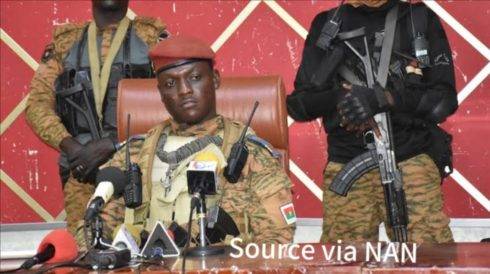In a shocking revelation, Human Rights Watch (HRW) has accused Burkina Faso’s military of carrying out a massacre in two northern villages, resulting in the deaths of over 200 civilians, including numerous children and infants. The report, released on Thursday, unveils the brutality inflicted upon innocent villagers on February 25th in the communities of Nondin and Soro. According to HRW, the toll of the massacre stands at 223 lives lost, with an alarming 56 children among the deceased.
This heinous act underscores the grim reality faced by civilians in Burkina Faso, where the conflict between state forces and militant groups has escalated into a humanitarian crisis of immense proportions. The callous targeting of non-combatants is a stark reminder of the profound suffering endured by innocent bystanders caught in the crossfire of armed conflict. Moreover, the systematic nature of these attacks raises serious concerns about the accountability of Burkina Faso’s military and the urgent need for international intervention to address the escalating violence.
Urgent Appeal for Justice and Accountability: HRW Calls for International Intervention
In the aftermath of the massacre, HRW has issued a fervent plea to the international community, urging the United Nations and the African Union to intervene and facilitate a thorough investigation into the atrocities committed. Executive Director of HRW, Tirana Hassan, emphasized the necessity of international support in uncovering the truth behind these grave violations of human rights. The demand for justice resonates deeply among survivors and the families of the victims, who have been left to grapple with the unimaginable loss inflicted upon their communities.
The massacre in Nondin and Soro villages serves as a chilling reminder of the pervasive culture of impunity that prevails in Burkina Faso, where perpetrators of violence often evade accountability for their crimes. The lack of repercussions for such egregious acts not only perpetuates a cycle of violence but also undermines efforts to restore peace and stability in the region. As the international community grapples with the fallout of this senseless tragedy, the imperative to hold those responsible to account has never been more urgent. Only through concerted efforts to address the root causes of conflict and uphold the principles of justice can Burkina Faso hope to break free from the grip of violence and chart a path towards a more secure and prosperous future.
Escalating Violence and the Plight of Civilians: A Grim Reality in Burkina Faso
The massacre in Nondin and Soro villages underscores the harrowing plight faced by civilians in Burkina Faso, who continue to bear the brunt of a conflict marked by widespread violence and displacement. The targeting of innocent men, women, and children highlights the egregious disregard for human life that has come to characterize the tactics employed by both state-backed forces and militant groups operating in the region. With over 2 million people displaced and more than half of them children, the humanitarian toll of the conflict is staggering.
The HRW report sheds light on the alarming escalation of violence perpetrated by Burkina Faso’s security forces, who have increasingly resorted to brutal tactics under the guise of counterterrorism operations. The disproportionate use of force against civilians not only violates international law but also fuels resentment and mistrust among local communities, further exacerbating the cycle of violence. As Burkina Faso grapples with the dual challenges of insurgency and state repression, the urgent need for a coordinated international response to address the root causes of conflict and protect civilian lives has never been more apparent.
Brutal Army Attack in Burkina Faso Leaves Civilians Dead: Witnesses Speak Out
In a harrowing turn of events, witnesses and survivors recount a brutal army attack on Feb. 25 in Burkina Faso, leaving a devastating toll on civilians. The incident, initially believed to be in retaliation for an attack by Islamist fighters on a military camp near Ouahigouya, unfolded tragically as villagers faced the wrath of the army, resulting in a higher death toll than previously reported. The army, citing cooperation with militants, unleashed a massacre, sparing not even infants, according to reports verified by The Associated Press. This grim episode underscores the ongoing struggle for stability in the region.
Despite mounting evidence and eyewitness testimonies, Burkina Faso’s government remains tight-lipped, with a spokesperson declining to comment on the Feb. 25 attack. This silence only adds to the anguish of those affected and raises concerns about accountability and justice in the face of such atrocities. Denials from officials, attributing civilian deaths to jihadist fighters disguising themselves as soldiers, further complicate the narrative and heighten tensions within the country.
Burkina Faso’s Struggle Against Militancy Intensifies Amidst Political Turmoil
As Burkina Faso grapples with the aftermath of the Feb. 25 attack, the broader context of instability and violence in the region comes into focus. With over 20,000 lives lost since the emergence of jihadist violence nearly a decade ago, the country finds itself in a protracted battle against extremist groups affiliated with al-Qaida and the Islamic State. This relentless violence has left communities shattered and displaced, with no end in sight to the suffering endured by civilians.
The political landscape adds another layer of complexity to Burkina Faso’s plight. Following two coups in 2022, the junta, led by Capt. Ibrahim Traoré, promised to confront militant threats. However, analysts note a worsening of violence since the junta assumed power, casting doubts on its ability to effectively address the crisis. With half of the country’s territory outside government control, the situation remains precarious. Moreover, the junta’s decision to sever military ties with France, its former colonial ruler, in favor of Russian support underscores the shifting dynamics in international security partnerships. As Burkina Faso navigates this turbulent terrain, the urgent need for concerted efforts to protect civilians and restore stability cannot be overstated.
Table of Contents
Discover more from OGM News NG
Subscribe to get the latest posts sent to your email.














